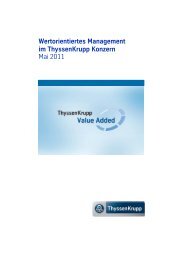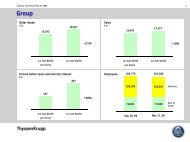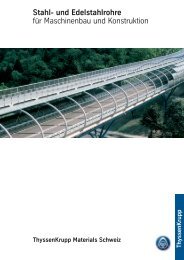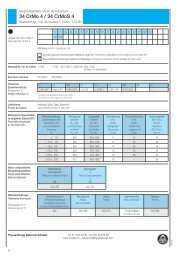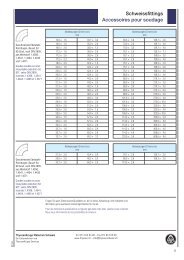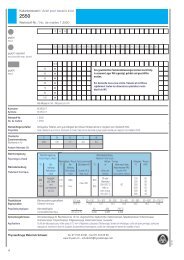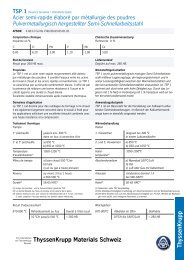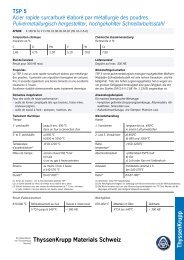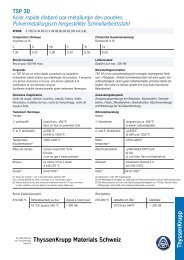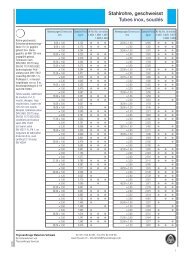Engineering
Engineering
Engineering
Create successful ePaper yourself
Turn your PDF publications into a flip-book with our unique Google optimized e-Paper software.
2.2 Management report on the Group Consolidated results of operations<br />
2.2 Management report on the Group Consolidated results of operations<br />
Natural gas prices<br />
ThyssenKrupp in Germany<br />
Bochum off-take point<br />
in €, indexed, October 2009 = 100<br />
160<br />
140<br />
120<br />
100<br />
80<br />
Oct<br />
2009<br />
Sept<br />
2011<br />
The emission allowances allocated to to<br />
ThyssenKrupp in in calendar year 2010 were<br />
were enough.<br />
enough.<br />
Natural gas prices in Germany higher<br />
In Germany the price paid by ThyssenKrupp for natural gas increased by 25% year-on-year because under<br />
the applicable contracts it is pegged to the price of oil. For the following two fiscal years we have secured<br />
prices on attractive terms – in particular in comparison with prices on the futures market.<br />
The situation at our operations abroad is positive, with previously agreed fixed price contracts permitting<br />
significant savings against the current market price. In France our companies use liquid trading points in the<br />
Netherlands to achieve considerably improved terms and conditions. In Spain a new natural gas contract<br />
entered into effect in the 4th quarter 2010/2011 with prices 8% below the already favorable level of the<br />
previous contract. In the USA natural gas prices are far lower than in Europe. The development of previously<br />
unprofitable gas reserves created a surplus which cannot be sold on the global market for technical reasons.<br />
The price of natural gas for our new plant complex in Alabama is therefore well below half that paid by<br />
similar plants in Germany.<br />
Energy transition increases electricity costs in Germany<br />
Due to our increased output we had to purchase extra electricity at short notice in 2010/2011. We<br />
succeeded in reducing our average price in Germany even though electricity prices increased in the wake of<br />
the economic recovery. On the futures market, too, prices have advanced considerably since the nuclear exit<br />
began. Electricity prices in Germany are at the top end of the European scale – driven by politically imposed<br />
costs such as the levy to subsidize renewable energies, an electricity tax increase, the subsidization of heatand-power<br />
cogeneration, and rising network charges.<br />
The situation in France is different: Here the government-regulated industrial electricity tariff expired at the<br />
end of June 2011 and was replaced with a new instrument. By using this we saved over €1 million in the<br />
4th quarter of the reporting year alone. In Italy we were able to keep electricity costs below the local price<br />
level by purchasing some volumes at more favorable foreign wholesale terms.<br />
Emissions trading: Hedge for third trading period<br />
In accordance with the legal rules, ThyssenKrupp received emission allowances for 21,263,403 tons of CO2<br />
in calendar year 2010. As actual emissions were 21,246,047 tons, the allocated emission allowances were<br />
enough. We have already purchased EU emission allowances at attractive market prices as a hedge for the<br />
third trading period (2013-2020).<br />
70




